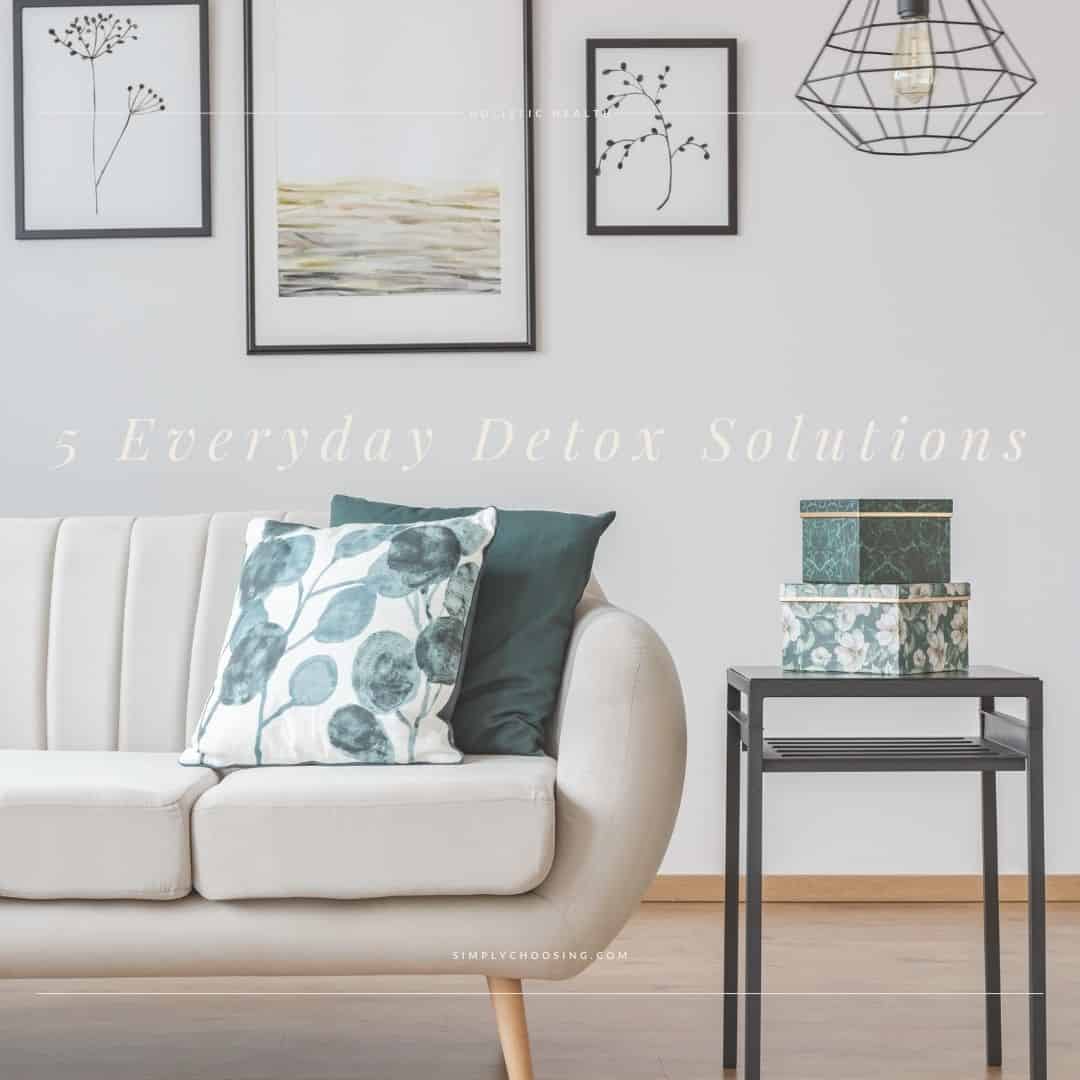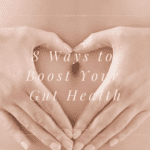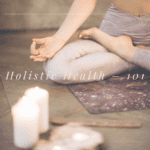What will you get from this blogpost:
- Reasons to start detoxing your home and environment
- 5 simple ways to incorporate detoxification into daily life
- A FREE downloadable Checklist to get started
In thelast blog post, we spoke about the difference between detoxification and cleansing, as well as the effects of detoxification on your health. Today, we will cover the benefits of incorporating detoxification into your home and environment. You will also discover 5 everyday detox solutions that can improve your overall health and well-being.
Why Detoxing Your Home Is As Important As Detoxing Your Body
While detoxifying the body is an important practice that should not be neglected, we often forget that this also applies to detoxifying the home and environment. After all, everything around us has a huge impact on how comfortable we ultimately feel in our bodies and minds.
There’s a reason why we shouldn’t treat our bodies with chemical and artificial products like cleaning solutions. There is also a reason why we should wash the apple we are going to eat as a snack. Likewise, there is a reason why the water we drink should be pure and clean.
All of this affects our health and well-being. Even if you don’t notice it in direct, typical symptoms, you will definitely experience discomfort in the long run. Because again, if we don’t take care of our bodies, they will eventually become overwhelmed with these toxic exposures, which in turn can lead to illness and in the worst cases, even death.
Detoxifying your home can help reduce the risk of exposure to toxins and chemicals that you would otherwise face. It’s one way to:
- give our bodies a break when we’re at home,
- to be more conscious of our lives in general,
- and to help us as a species make the world a tiny bit better every day.
Introducing The 5 Everyday Detox Solutions
Be aware, that detoxing and cleansing don’t have to be a one-size-fits-all program. There are many simple things you can implement into your daily life to both reduce exposure to harmful chemicals and help your body eliminate the toxins you can’t avoid.
We have already briefly covered the 5 everyday detox solutions in A Brief Introduction to Detoxification and Cleansing. They can of course be adapted by you as you see fit.

Limit exposure to toxins that you can control
Toxins and chemicals are substances that can really harm the body if we ingest or inhale the solutions. Probably most of us know this. What few know is that these toxins can enter our system just by touch.
The skin is the largest organ in our body. It is a waterproof shell for our entire body and the first line of defense against the outside world. It is also our cooling system via the sweat we excrete from the body.
Now imagine this: With all the environmental toxins in the air, as well as in the food we eat, our skin defends us from harmful bacteria, toxins, and chemicals 24 hours a day.
As if that weren’t enough, we voluntarily apply a layer of chemicals to our faces and bodies, clean our hands with chemically contaminated detergents, and block the cooling system with deodorants full of substances we can’t even pronounce.

While we can’t control everything that happens around us and to us in this life, there is enough that we can actually influence. A good example of this is toxins and chemicals used in our own homes:
- facial and body care products,
- cosmetics and makeup,
- the detergent you use to wash your clothes,
- and cleaning products.
The good news is that you can control them by making changes:
- Switch your makeup and facial care products to natural ones.There are hundreds of new brands that focus on natural skincare products and makeup. I use NUI Cosmetics (not an affiliate link) and have never been more pleased with my makeup routine. For my skincare face, I have to admit I’m a big fan of Dr. Niedermaier (not an affiliate link), though I’m not sure if you can get them worldwide.
- Use natural cleaning products for your home and natural detergents for your clothes.For the cleaning products I use, I am very happy with the products from a local no-waste store. I don’t have a brand recommendation for them. The detergent I use is from Sonett (not an affiliate link). They also have cleaning products that may be good, but I’ve never tried them myself.
Eat nutrient-dense, whole foods and avoid processed foods
Due to the overproduction of food, the soil we use today has fallen on hard times and hardly contains the nutrients that make vegetables and fruits as healthy as they should be.
The big agribusinesses are demanding more where there is less. And what grows is coated with pesticides to make it last longer and look nicer when it finally hits supermarket shelves. This leads to uncontrolled toxicity that we consume.
Of course, when I say “uncontrolled,” that only applies if you don’t wash what you eat, if you skip the organic products, and/or if you don’t buy your vegetables and fruits from a local farmer.

While there are some problems with the fruits and vegetables we eat, the bigger concerns are all the processed foods. You may know that the chips you just bought are not as healthy as the original: potato. Or you may think a product is healthy, only to find that it contains sugar or some other artificial substance.
Processed foods are a whole other topic we could cover here. To make a long story short, authors like Michael Greger recommend completely eliminating processed foods from your plate in order to get or stay healthy.
A nutrient-dense, whole-foods diet that avoids processed foods looks like this:
- Buy lots of vegetables and fruits and eat them daily. Buy local and/or organic.On a side note, you may want to contact a local farmer. I have had some experiences where the vegetables and fruits were actually cheaper than what you can buy at the supermarket.
- Try to avoid all processed foods, especially sugary, salty and fatty products. These will not do you any good.An easy way to tell if something is processed is to ask yourself, is this product grown from the earth? If not, check the labels to make sure the ingredients are healthy. Finally, ask yourself if you really want to buy the processed product you just picked up, or could you make it yourself – only healthier?
That’s it, you’re now eating a nutrient-dense, whole-food diet and avoiding processed foods.
Here are particularly good foods that promote the elimination of toxins:
- Cruciferous vegetables: broccoli, brussel sprouts, and cauliflower.
- Bitter vegetables: watercress, kale, and arugula.
- Artichokes
- Lemons
- Ginger
Hydrate your body

Water is essential for life. Everything that lives depends on water. We, too, depend on water.
While each of us has different water needs depending on our body size, activity level, the climate we live in, and our diet, we should drink water every day.
Note: water does not mean anything liquid like coke zero, ice tea, or coffee.
To thrive, be healthy and what we treat today: Eliminating toxins from the body, you need water. Pure water without sparkling and any additives.
As a daily rule of thumb for drinking water, your urine should be clear and you should not go a long time without urinating. For most people, that’s about 2 to 2.5 liters of water per day.
If you have trouble drinking enough water, it can help:
- if you have a reminder in your phone to drink water every 30 minutes or so.
- to avoid small glasses that need to be refilled often. It is helpful if you buy a 1- or 2-liter glass bottle to refill and drink throughout the day instead.
- or if you count the glasses you drink each day and come up with at least 8 glasses per day.
However you do it, do it for 21 days straight and it will most likely become a new habit in your daily life.
In addition to plain water, medicinal herbal teas help detoxify your body. Some examples:
- Milk Thistle
- Dandelion root
- Nettles
- Green tea
When buying tea, I personally recommend loose tea, as many of the tea bags used commercially contain microplastic elements that can do more harm than good to your body.
Regular bowel movements
Bowel movements and their consistency will be a topic we will talk about more than enough in this blog, so you better get used to it.

Unfortunately, society taboos this subject, but actually it’s one of the most important ones to talk about openly. Because, the color, consistency, and regularity of stools alone tell you a lot about a person’s health. It’s almost fascinating!
A healthy person should have regular bowel movements about 2 to 3 times a day. Ideally, this should happen in the morning and afternoon about 6 to 8 hours apart. I will keep you with more details for another in-depth blog post.
What is important to know is that if you have irregular bowel movements, toxins can be reabsorbed into your body. In addition, the food you have eaten will ferment after a day or two, and the result is a bloated, constipated abdomen. The worse it gets, the more symptoms appear, including bad breath, abdominal pain, and other intestinal disorders.
To ensure regular bowel movements, here’s what you can do:
- make sure you are drinking enough fluids,
- eat high-fiber foods such as vegetables, beans and nuts,
- move your body daily by exercising,
- supplement with probiotics, prebiotics, and magnesium,
- and, most importantly, make sure you find the cause of your digestive problems.
Getting enough sleep
Sleep is a tricky thing. Most of the time we underestimate the power of sleep, but when we do sleep, we may sleep too much, thinking it’s good for us, which in turn can be very harmful to our bodies.
You can think of it this way, as Alex Korb talks about in his book Upward Spiral on Neuroscientific changes against depression: the damage doesn’t occur all at once. It starts gradually and gains momentum over time.
When you have slept poorly, you wake up exhausted. This exhaustion leads to a clouded mind that struggles to do the work that needs to be done that day. This leads to a negative mood, less motivation to eat healthy and exercise, which eventually leads to an imbalance.
Imbalance can make you feel even worse. These negative feelings, in turn, lead to difficulty shutting down at night, which again leads to poor sleep. So what happens next? You will experience the same thing over and over again until you break the cycle.

But what exactly is sleep good for?
During the hours of sleep, many physical processes take place. Your body has the time to process everything that happened during the day, it can finally digest food, it fights viruses and all kinds of problems your body is facing. It is also the time when detoxification through the lymphatic system takes place.
Sleep is important for our health and well-being. Therefore, it is important to get adequate and quality sleep every night. However, make sure that the duration of sleep stays between 6 and 8 hours per night and no more.
If you are having trouble sleeping due to stress, the following strategy may be helpful:
- A relaxing nighttime routine: a warm bath, a relaxing yoga class, or a bedtime meditation.Finding time to quiet your mind is crucial. Habits that promote rest or even sleepiness contribute to more restful sleep.
- Refraining from screens: read for 30 minutes before going to bed instead.I would recommend you not to read a scientific book at this time of the day, but a good romance novel or any topic that interests you without having to think too much will do. After all, you want to switch off and avoid thinking even more.
- Drinking a calming tea: chamomile, lavender, lemon balm, and St. John’s wort.Detoxification takes place 24 hours a day. Whether you want it to or not. By limiting the exposure to toxins in your daily life, you are helping your body detoxify in this toxic environment we live in. Whatever small change you incorporate into your life, you are sure to notice a change – be it a small one or a big one.
I encourage you to think about your life, the environment you live in, your body, and your feelings. Is there anything you need to work on, anything that needs a change?
Chances are, there’s plenty to think about. Take this post as a sign to get started. Use it as a small guide to creating a richer, happier life where you feel good in your body, mind, and environment.
To help you get started, I’ve created a free checklist for you.
What small change have you incorporated into your life? Do you have additional tips you want to share with us?
I’d love to hear from you in the comments below.







0 Comments
Trackbacks/Pingbacks